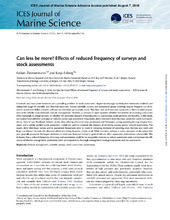Can less be more? Effects of reduced frequency of surveys and stock assessments
Peer reviewed, Journal article
Published version

Åpne
Permanent lenke
https://hdl.handle.net/1956/12718Utgivelsesdato
2016Metadata
Vis full innførselSamlinger
Originalversjon
https://doi.org/10.1093/icesjms/fsw134Sammendrag
Uncertain and inaccurate estimates are a prevailing problem in stock assessment, despite increasingly sophisticated estimation methods and substantial usage of scientific and financial resources. Annual scientific surveys and assessment group meetings require frequent use of research vessels and skilled research staff and are, therefore, particularly costly. This data- and work-intensive approach is often considered paramount for reliable stock estimates and risk management. However, it remains an open question whether the benefits of increasing assessment effort outweigh its marginal costs, or whether the potential impacts of investing less in assessments could generate net benefits. In this study, we explore how different scenarios of reduced survey and assessment frequencies affect estimated stock biomass, predicted catch, and uncertainty. Data of two Northeast Atlantic stocks, blue whiting (Micromesistius poutassou) and Norwegian spring-spawning herring (Clupea harengus), and a widely applied stock assessment model are used to compare the impacts of removing surveys and/or annual assessments. The results show that lower survey and/or assessment frequencies tend to result in deviating estimates of spawning-stock biomass and catch and larger confidence intervals, the observed differences being, however, mostly small. While scenarios without a survey datapoint in the assessment year generally produced the largest deviations in estimates, biannual surveys in general did not affect assessment performance substantially. This indicates that a reduced frequency of surveys and assessments could be an acceptable measure to reduce assessment costs and increase the efficiency of fisheries management, particularly when accompanied by thorough management strategy evaluations and risk assessments.
